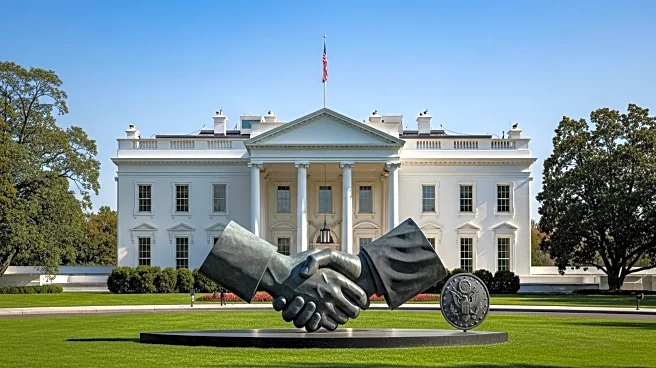What's Happening?
President Trump met with Pakistan's Prime Minister Shehbaz Sharif and Army Chief Field Marshal Asim Munir at the White House, marking a significant moment in US-Pakistan relations. The meeting, attended by Secretary of State Marco Rubio, followed a recent trade deal between the two nations. This encounter comes after Trump briefly met Sharif at the UN General Assembly in New York. The meeting is seen as a thaw in relations, with Trump referring to the Pakistani leaders as 'great leaders.' Historically, US-Pakistan ties have been strained due to allegations of Pakistan supporting terrorism, notably after Osama bin Laden was found in Pakistan. However, recent agreements, including Pakistan supplying critical minerals and rare earth elements to the US, have paved the way for improved relations. A US firm is investing $500 million in Pakistani minerals, and a trade agreement has been reached, involving a 19% tariff on Pakistani imports.
Why It's Important?
The meeting signifies a potential shift in US foreign policy towards Pakistan, which has traditionally been viewed as a strategic security partner. The improved relations could lead to increased economic cooperation, benefiting both countries. For Pakistan, the agreements could bolster its economy through foreign investment and trade. For the US, access to critical minerals and rare earth elements is crucial for technological and industrial sectors. The warming ties may also influence regional dynamics, particularly in South Asia, where US involvement has historically been significant. The meeting could also impact US relations with India, given the recent military confrontations between India and Pakistan.
What's Next?
The next steps may involve further diplomatic engagements and economic agreements between the US and Pakistan. The US might continue to explore opportunities in Pakistan's oil reserves, as previously pledged by Trump. Additionally, the US could leverage its improved relations with Pakistan to mediate regional conflicts, particularly between India and Pakistan. Political leaders and businesses in both countries are likely to monitor these developments closely, assessing the potential benefits and challenges of deeper cooperation.
Beyond the Headlines
The warming ties between the US and Pakistan could have broader implications for international diplomacy and regional stability. Ethically, the US's engagement with Pakistan, despite past allegations of terrorism support, raises questions about balancing strategic interests with moral considerations. Culturally, the improved relations might foster greater people-to-people connections, enhancing mutual understanding and collaboration. Long-term, this development could shift geopolitical alliances and influence global power dynamics.










